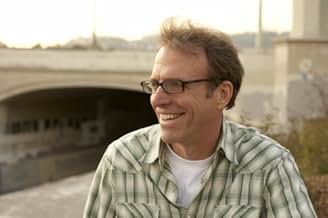VALUTAZIONE IMDb
7,4/10
28.851
LA TUA VALUTAZIONE
L'esposizione di Kirby Dick sul consiglio di valutazione dei film americani.L'esposizione di Kirby Dick sul consiglio di valutazione dei film americani.L'esposizione di Kirby Dick sul consiglio di valutazione dei film americani.
- Regia
- Sceneggiatura
- Star
- Premi
- 4 vittorie e 3 candidature totali
Clark Baker
- Self - Private Investigator
- (as Clark)
Recensioni in evidenza
America is the land of the free, so in order to constrain people to do what you want them to do, you have to let them think it's their choice. How do you do that? You create a completely anonymous committee, supposedly composed of concerned parents, to rate the films that appear and, depending on that rating, they will get more or less media coverage, distribution, target audience size. You also finance this body with the money of the seven largest film studios in the US. This functioning censorship committee is called the MPAA.
The film is highly biased, to a point where it gets a little annoying, but the information contained in it is sound, proved and makes one think about the way public opinion is manipulated, ever so slightly, towards a desired average point of view. If you ever wondered how Americans can seem so ordinary, yet have completely different opinions about the same subjects as any other people, then this movie will answer part of that question. Very insightful is the presentation of the seven major film studios who own 95% of the American film industry, parts of larger conglomerates that own 90% of all mass-media. Also interesting, the role of the clergy in movie rating. Yes, I did say clergy, as in priests. In the appeals commission there are always an episcopalian priest and a catholic one. No other religions get to add their input.
A must see movie, not a conspiracy theory film, but certainly one that is against the system. The system here being the absurd movie rating system of the MPAA.
The film is highly biased, to a point where it gets a little annoying, but the information contained in it is sound, proved and makes one think about the way public opinion is manipulated, ever so slightly, towards a desired average point of view. If you ever wondered how Americans can seem so ordinary, yet have completely different opinions about the same subjects as any other people, then this movie will answer part of that question. Very insightful is the presentation of the seven major film studios who own 95% of the American film industry, parts of larger conglomerates that own 90% of all mass-media. Also interesting, the role of the clergy in movie rating. Yes, I did say clergy, as in priests. In the appeals commission there are always an episcopalian priest and a catholic one. No other religions get to add their input.
A must see movie, not a conspiracy theory film, but certainly one that is against the system. The system here being the absurd movie rating system of the MPAA.
Kirby Dick's expose of the MPAA's ratings process only confirms the suspicion that motion picture ratings are virtually worthless, arbitrarily assigned by an elite panel who purport to have our country's children's best interests at heart, but who seem to think that an exposed breast is more harmful to them than seeing a gunshot to the head.
It's absolutely infuriating that the country's churches have a seat on the ratings boards and a say in what content is or is not suitable for consumption. It's infuriating that an NC-17 rating exists at all (the board is essentially usurping the judgement and decision-making abilities of parents), but doubly infuriating that it's used as a punishment to "encourage" filmmakers to alter their films so that they're more palatable for mainstream film goers. For a while I was kind of sad that home video and the Internet seems to be supplanting movie theatres as the preferred venue for watching films, but now I appreciate the democratizing effect of companies like Netflix and Blockbuster, who have made great filmmakers less reliant on corporate theatre chains to get their films distributed and seen.
As a documentary, "This Film Is Not Yet Rated" is rather disorganized. Dick has good points to make, but their impact is blunted by tangents and off-topic tirades. Dick hires a private detective to track down the identities of the ratings board, and spends far too much of his 96 minutes following the details of that investigation. On the plus side, it's great to see directors and actors like Kimberly Peirce, Maria Bello and John Waters given a venue to vent their frustrations at the ratings practice.
One of the main points Dick makes, and one I heartily agree with, is that the ratings board focuses far more energy on censoring sex in films than they do violence, a point that is unintentionally driven home by none other than the ratings board chairman herself towards the film's climax. Dick asks why his documentary received an NC-17 rating and she cites the sexual content that appears in some of the clips of films that have received NC-17 ratings sprinkled throughout the documentary. She seems to have no problem with some of the very violent content included in clips from some of those very same movies. What an idiot.
Grade: B+
It's absolutely infuriating that the country's churches have a seat on the ratings boards and a say in what content is or is not suitable for consumption. It's infuriating that an NC-17 rating exists at all (the board is essentially usurping the judgement and decision-making abilities of parents), but doubly infuriating that it's used as a punishment to "encourage" filmmakers to alter their films so that they're more palatable for mainstream film goers. For a while I was kind of sad that home video and the Internet seems to be supplanting movie theatres as the preferred venue for watching films, but now I appreciate the democratizing effect of companies like Netflix and Blockbuster, who have made great filmmakers less reliant on corporate theatre chains to get their films distributed and seen.
As a documentary, "This Film Is Not Yet Rated" is rather disorganized. Dick has good points to make, but their impact is blunted by tangents and off-topic tirades. Dick hires a private detective to track down the identities of the ratings board, and spends far too much of his 96 minutes following the details of that investigation. On the plus side, it's great to see directors and actors like Kimberly Peirce, Maria Bello and John Waters given a venue to vent their frustrations at the ratings practice.
One of the main points Dick makes, and one I heartily agree with, is that the ratings board focuses far more energy on censoring sex in films than they do violence, a point that is unintentionally driven home by none other than the ratings board chairman herself towards the film's climax. Dick asks why his documentary received an NC-17 rating and she cites the sexual content that appears in some of the clips of films that have received NC-17 ratings sprinkled throughout the documentary. She seems to have no problem with some of the very violent content included in clips from some of those very same movies. What an idiot.
Grade: B+
Alright, let's just say it right from the start: the MPAA sucks. They make good films turn into films that are hacked up just to fit their 'moral' agenda, and they are the bane of the existence of Hollywood filmmakers. Being from Canada, I have the benefit of a much fairer system, but one that is affected by the MPAA nonetheless. So when a film like This Film is Not Yet Rated comes out, I definitely become interested. And interesting is what this film is.
The documentary is about the NC-17 rating primarily, and the people and groups fighting against it. When it is not showing interviews and clips about the horror stories in trying to get director's films cut to a suitable R or PG-13 rating, it is about director and star Kirby Dick's hired private investigators trying to get the names of the members of the MPAA ratings board.
Watching the film is a bit of an on and off experience.
On because the interviews with directors like Kevin Smith, Atom Egoyan, Jamie Babbit, Matt Stone, and Wayne Kramer are absolutely fascinating to listen to. They talk about the troubles they had with the MPAA, show the "obscene" footage from their films, and even offer some ideas as to how the MPAA can change for the better, rather than completely tear the company up to pieces. All of these clips are excellently edited together, and in some instances, offer some pretty amusing anecdotes. Seeing the offending clips from the films was also interesting, as just simply talking about them would defeat the purpose of the documentary itself (which thankfully, originally got an NC-17 for having the clips in the film).
These interviews also offer a lot of moments talking about the rules of the MPAA itself. Listening to how ridiculous some get can be hilarious, but it is also enlightening. For someone who is into film and only knows the basics of the MPAA, it offers a lot of information on the final process a movie has to go through before it makes it to the theatre. The clips offered a lot more information than I imagined, and they elevate the film greatly.
Another element I liked was showing the hypocrisies of the MPAA, and interview footage of former head Jack Valenti himself. It made the film feel a whole lot more complete, and gave it more of an authentic circular viewpoint. If they had simply just included the viewpoints of the filmmakers, journalists, authors, doctors and lawyers (like I half expected them to show), than they would not have nearly had as much credibility as they end up having. Of course, these moments are practically the funniest in the film, but they still offer plenty of intriguing insights. I think some comparisons to other country's film rating systems probably could have only enlivened this credibility even more.
Where I think the film fails and becomes off is in the almost obsessive search to find out the identity of the MPAA's raters. I understand that it is pivotal to the entirety of the film, but it just drags the film down into depravity and ridiculousness. It shows these moments in an amusing light, but they really are not that funny. They offer a bit too much information in some sequences (like blurring out license plate numbers, but having the private investigator say the numbers anyway), and the payoff just does not feel entirely proper. It does not have the intensity or the postmodern awareness that the interview clips do. They just feel kind of boring, and in some parts, unnecessary. Dick was already exposing the fraudulence and downright deceitful nature of the MPAA. Did he really need to go so far as to expose everything imaginable?
I am unsure of why it the exposing got to me so much, but it just did not feel totally right in a lot of cases. I liked how much dedication Dick and his crew had for the material, but it feels more like two different films than it does one cohesive whole. The information does not become overwhelming in any scene, but it does feel like overkill in some parts. The film is just over ninety minutes long, but it feels like it could have been trimmed. And most of that trimming could have probably come from scenes involving the private investigators. They just are nowhere near as interesting as the insight and horror stories offered in the interviews and film clips.
This Film is Not Yet Rated is an interesting documentary, and it offers a lot of insight that I seriously doubted it would. It is definitely a recommended watch for anyone who is interested in the film-making process, but for anyone else, it may just be something to casually watch part of and then turn off. I will hand it to Dick though. The final product is something I never thought the MPAA would have passed with any rating.
7.5/10.
The documentary is about the NC-17 rating primarily, and the people and groups fighting against it. When it is not showing interviews and clips about the horror stories in trying to get director's films cut to a suitable R or PG-13 rating, it is about director and star Kirby Dick's hired private investigators trying to get the names of the members of the MPAA ratings board.
Watching the film is a bit of an on and off experience.
On because the interviews with directors like Kevin Smith, Atom Egoyan, Jamie Babbit, Matt Stone, and Wayne Kramer are absolutely fascinating to listen to. They talk about the troubles they had with the MPAA, show the "obscene" footage from their films, and even offer some ideas as to how the MPAA can change for the better, rather than completely tear the company up to pieces. All of these clips are excellently edited together, and in some instances, offer some pretty amusing anecdotes. Seeing the offending clips from the films was also interesting, as just simply talking about them would defeat the purpose of the documentary itself (which thankfully, originally got an NC-17 for having the clips in the film).
These interviews also offer a lot of moments talking about the rules of the MPAA itself. Listening to how ridiculous some get can be hilarious, but it is also enlightening. For someone who is into film and only knows the basics of the MPAA, it offers a lot of information on the final process a movie has to go through before it makes it to the theatre. The clips offered a lot more information than I imagined, and they elevate the film greatly.
Another element I liked was showing the hypocrisies of the MPAA, and interview footage of former head Jack Valenti himself. It made the film feel a whole lot more complete, and gave it more of an authentic circular viewpoint. If they had simply just included the viewpoints of the filmmakers, journalists, authors, doctors and lawyers (like I half expected them to show), than they would not have nearly had as much credibility as they end up having. Of course, these moments are practically the funniest in the film, but they still offer plenty of intriguing insights. I think some comparisons to other country's film rating systems probably could have only enlivened this credibility even more.
Where I think the film fails and becomes off is in the almost obsessive search to find out the identity of the MPAA's raters. I understand that it is pivotal to the entirety of the film, but it just drags the film down into depravity and ridiculousness. It shows these moments in an amusing light, but they really are not that funny. They offer a bit too much information in some sequences (like blurring out license plate numbers, but having the private investigator say the numbers anyway), and the payoff just does not feel entirely proper. It does not have the intensity or the postmodern awareness that the interview clips do. They just feel kind of boring, and in some parts, unnecessary. Dick was already exposing the fraudulence and downright deceitful nature of the MPAA. Did he really need to go so far as to expose everything imaginable?
I am unsure of why it the exposing got to me so much, but it just did not feel totally right in a lot of cases. I liked how much dedication Dick and his crew had for the material, but it feels more like two different films than it does one cohesive whole. The information does not become overwhelming in any scene, but it does feel like overkill in some parts. The film is just over ninety minutes long, but it feels like it could have been trimmed. And most of that trimming could have probably come from scenes involving the private investigators. They just are nowhere near as interesting as the insight and horror stories offered in the interviews and film clips.
This Film is Not Yet Rated is an interesting documentary, and it offers a lot of insight that I seriously doubted it would. It is definitely a recommended watch for anyone who is interested in the film-making process, but for anyone else, it may just be something to casually watch part of and then turn off. I will hand it to Dick though. The final product is something I never thought the MPAA would have passed with any rating.
7.5/10.
Fast paced, absorbing, at times comical exposé of the Motion Picture Association of America (MPAA) film rating system. While it is in name a "voluntary" system, i.e., a filmmaker can choose whether to submit a film to MPAA for rating purposes, in fact the theater chains that promise wide exposure and revenues for a film they screen will rarely touch a movie that is unrated or that receives the most restrictive rating, NC-17 (no "child" 17 or younger admitted under any circumstances.) The ratings are allegedly created by a panel of "average" parents of school age children, according to long time MPAA CEO, Jack Valenti, and other officials. There are no experts, e.g., no psychologists who study the impact of media on kids' attitudes and behavior. Panel members are selected by the rating committee chair, Joan Graves. Members' identities are kept secret to "avoid pressures" on their decision making.
Among other things, director Kirby Dick discovers that (a) there are no explicit criteria or guidelines for ratings; (b) ditto for selection of raters (who, if they work full time, receive annual salaries of $30,000); (c) one recent rater was childless; the children of several others were adults; (d) raters frequently discuss films with industry representatives, arguably the most important source of "pressure" on their decisions; (e) majority votes determine the recommended rating, but these votes are not binding; (f) in case of ties (there are eight voting members, including Ms. Graves), Ms. Graves also is empowered to cast a tie-breaking judgment; and (g) there is an appeals process.
However, the appeals board is composed exclusively of representatives of the major studios, distributors and exhibition chains, and rarely do they controvert the initial rating. This is no surprise, since the MPAA is entirely financed by the six largest studios (responsible for 90% of the films released domestically) and their conglomerate corporate media owners (who control 95% of all media outlets in the U.S.) Details of all rating board and appeal decisions are kept secret. To create the illusion of transparency, two clergymen, representing Roman Catholics and Protestants, always sit in as observers at appeals hearings. But they too are required not to disclose information on the appeal decision process.
Compared to a number of other rating systems that exist in various countries worldwide, the MPAA approach is by far the most secretive, and contrary to every other system, it is far more restrictive of sexual content than violence. Kirby Dick also cites examples that strongly suggest greater bias (i.e., greater likelihood of getting an NC-17 rating) against films depicting gay/lesbian sex scenes than those with heterosexual scenes.
Dick mixes illustrative film clips, talking heads, historical notes on the evolution of ratings, a rundown on what appear to be the implicit criteria for ratings; a stalking investigation to discover the identities of raters and appeal board members; and his personal experience in submitting an earlier cut of this film to MPAA for a rating (it got an NC-17 for sexually explicit content). Atom Egoyan, Kimberly Peirce, Kevin Smith and John Waters are among independent filmmakers interviewed by Dick. Ms. Peirce raises the interesting notion that MPAA ratings may also be more biased against films with scenes connoting female sexual pleasure than films showing male pleasure.
Dick generally maintains a tone of wry humor, especially in showing us his day-by-day use of private investigators to track down and identify raters. There's almost a Keystone Cops flavor to the stalking antics of the women PIs he has hired, with Dick along for the ride. His re-creation of phone conversations with Joan Graves and the MPAA Chief Counsel, when he protests the rating of his own film, are also as funny as they are biased. (He uses animation to visually depict these officials as mean spirited grumps in split screen scenes that simultaneously show real time footage of Dick himself at his end of these conversations.) Dick is less successful in his review of information suggesting the implicit or inferable criteria raters use, based on film content and actual ratings. He zips through too much information too fast for anybody to absorb. Still, this is a bravura piece of advocacy journalism. The film gives us ample information to conclude that the MPAA system of corporate control of ratings, when combined with control of film distribution and screening based on these ratings, effectively results in a clever censorship arrangement that would certainly violate First Amendment rights were it not for the illusion of "voluntariness" that is perhaps the most ingenious aspect of this system.
Anybody is free to make a film about anything, of course. But whether it will be screened, or even advertised, let alone able to return revenues sufficient to defray the costs of production, is a very carefully controlled process. And what is the point of making a film that will not be seen? As in political campaigning, free speech is hardly free. Those with the most corporate clout rule both the campaigning and movie making businesses. What's worse, in our characteristic American manner, we shrink puritanically from sex on screen but remain inured to the effects of violence. My grade: 7.5/10 (low B+) (Seen on 09/10/06)
Among other things, director Kirby Dick discovers that (a) there are no explicit criteria or guidelines for ratings; (b) ditto for selection of raters (who, if they work full time, receive annual salaries of $30,000); (c) one recent rater was childless; the children of several others were adults; (d) raters frequently discuss films with industry representatives, arguably the most important source of "pressure" on their decisions; (e) majority votes determine the recommended rating, but these votes are not binding; (f) in case of ties (there are eight voting members, including Ms. Graves), Ms. Graves also is empowered to cast a tie-breaking judgment; and (g) there is an appeals process.
However, the appeals board is composed exclusively of representatives of the major studios, distributors and exhibition chains, and rarely do they controvert the initial rating. This is no surprise, since the MPAA is entirely financed by the six largest studios (responsible for 90% of the films released domestically) and their conglomerate corporate media owners (who control 95% of all media outlets in the U.S.) Details of all rating board and appeal decisions are kept secret. To create the illusion of transparency, two clergymen, representing Roman Catholics and Protestants, always sit in as observers at appeals hearings. But they too are required not to disclose information on the appeal decision process.
Compared to a number of other rating systems that exist in various countries worldwide, the MPAA approach is by far the most secretive, and contrary to every other system, it is far more restrictive of sexual content than violence. Kirby Dick also cites examples that strongly suggest greater bias (i.e., greater likelihood of getting an NC-17 rating) against films depicting gay/lesbian sex scenes than those with heterosexual scenes.
Dick mixes illustrative film clips, talking heads, historical notes on the evolution of ratings, a rundown on what appear to be the implicit criteria for ratings; a stalking investigation to discover the identities of raters and appeal board members; and his personal experience in submitting an earlier cut of this film to MPAA for a rating (it got an NC-17 for sexually explicit content). Atom Egoyan, Kimberly Peirce, Kevin Smith and John Waters are among independent filmmakers interviewed by Dick. Ms. Peirce raises the interesting notion that MPAA ratings may also be more biased against films with scenes connoting female sexual pleasure than films showing male pleasure.
Dick generally maintains a tone of wry humor, especially in showing us his day-by-day use of private investigators to track down and identify raters. There's almost a Keystone Cops flavor to the stalking antics of the women PIs he has hired, with Dick along for the ride. His re-creation of phone conversations with Joan Graves and the MPAA Chief Counsel, when he protests the rating of his own film, are also as funny as they are biased. (He uses animation to visually depict these officials as mean spirited grumps in split screen scenes that simultaneously show real time footage of Dick himself at his end of these conversations.) Dick is less successful in his review of information suggesting the implicit or inferable criteria raters use, based on film content and actual ratings. He zips through too much information too fast for anybody to absorb. Still, this is a bravura piece of advocacy journalism. The film gives us ample information to conclude that the MPAA system of corporate control of ratings, when combined with control of film distribution and screening based on these ratings, effectively results in a clever censorship arrangement that would certainly violate First Amendment rights were it not for the illusion of "voluntariness" that is perhaps the most ingenious aspect of this system.
Anybody is free to make a film about anything, of course. But whether it will be screened, or even advertised, let alone able to return revenues sufficient to defray the costs of production, is a very carefully controlled process. And what is the point of making a film that will not be seen? As in political campaigning, free speech is hardly free. Those with the most corporate clout rule both the campaigning and movie making businesses. What's worse, in our characteristic American manner, we shrink puritanically from sex on screen but remain inured to the effects of violence. My grade: 7.5/10 (low B+) (Seen on 09/10/06)
Since the Hays Code, filmmakers have had a lot more freedom over the content of their films. However, the MPAA ratings board still does exercise a certain de facto censorship power. Most people do not realize this.
"This Film is not Yet Rated" exposes the arbitrariness, secrecy, and bias of the MPAA ratings board and makes the viewer question why movies receive the ratings they do.
Kirby Dick puts together a nice cross-section of directors and "talking heads" who discuss the MPAA ratings board's biases when it comes to realism, sex, violence, gay themes, and other taboo issues in films.
Dozens of major directors have had problems with the MPAA ratings board - they either received the NC-17 (or the old "X") rating or had to cut their films to meet the requirements of the ratings board. Some examples are: Kubrick, Tarantino, Lynch, Woo, Friedkin, Peckinpah, Aronofsky, and countless others.
This film exposes the fact that the ratings board is made up of people who are given NO criteria and NO training for rating films, so they basically use their own personal (and obviously heavily biased) judgments to decide what rating a particular movie should receive.
This is an important film because so few people realize how movies are rated in the U.S. Even fewer realize how problematic (biased, anti-democratic, non-transparent, not accountable) our system is.
It is also well put together, so it is easier to watch than most documentaries.
I would have liked to have heard more comparisons between the U.S. rating system and others worldwide, something that was only briefly touched upon.
9 out of 10
"This Film is not Yet Rated" exposes the arbitrariness, secrecy, and bias of the MPAA ratings board and makes the viewer question why movies receive the ratings they do.
Kirby Dick puts together a nice cross-section of directors and "talking heads" who discuss the MPAA ratings board's biases when it comes to realism, sex, violence, gay themes, and other taboo issues in films.
Dozens of major directors have had problems with the MPAA ratings board - they either received the NC-17 (or the old "X") rating or had to cut their films to meet the requirements of the ratings board. Some examples are: Kubrick, Tarantino, Lynch, Woo, Friedkin, Peckinpah, Aronofsky, and countless others.
This film exposes the fact that the ratings board is made up of people who are given NO criteria and NO training for rating films, so they basically use their own personal (and obviously heavily biased) judgments to decide what rating a particular movie should receive.
This is an important film because so few people realize how movies are rated in the U.S. Even fewer realize how problematic (biased, anti-democratic, non-transparent, not accountable) our system is.
It is also well put together, so it is easier to watch than most documentaries.
I would have liked to have heard more comparisons between the U.S. rating system and others worldwide, something that was only briefly touched upon.
9 out of 10
Lo sapevi?
- QuizThe MPAA announced that starting in March of 2007, it will change their policy and allow filmmakers to cite other film's ratings as comparison. The MPAA will also provide information about the demographics of its board.
- Citazioni
John Waters: I also heard on 'A Dirty Shame' - and I have no proof of this - that there were doctors involved... and that some of the kinkier terms, like felching and stuff, that they explained to the MPAA what felching meant. Now, I would like to have heard that because felching, no one has ever done felching. Felching is when you fuck someone and suck your own cum out of their asshole. Well, I know a lot of perverts and I don't know anyone who's done that.
- Curiosità sui creditiAt the end credits a count of what the film shows: FUCKS(OR DERIVATIONS OF): 20 MOTHERFUCKERS: 3 HUMPS: 220 NIPPLES: 10 INTERCOURSE WITH PIE: 1 CARTOONS/PUPPETS IN SEXUAL POSITIONS: 15 SPLOSHING: 1 FELCHING: 0
- ConnessioniEdited into This Film Is Not Yet Rated: Deleted Scenes (2009)
- Colonne sonoreAppeals Members
Written and Performed by Michael S. Patterson (ASCAP)
Courtesy of Absynthe Zelery Music (ASCAP)
I più visti
Accedi per valutare e creare un elenco di titoli salvati per ottenere consigli personalizzati
- How long is This Film Is Not Yet Rated?Powered by Alexa
Dettagli
- Data di uscita
- Paesi di origine
- Lingua
- Celebre anche come
- Los censores de Hollywood
- Luoghi delle riprese
- Aziende produttrici
- Vedi altri crediti dell’azienda su IMDbPro
Botteghino
- Lordo Stati Uniti e Canada
- 306.845 USD
- Fine settimana di apertura Stati Uniti e Canada
- 30.664 USD
- 3 set 2006
- Lordo in tutto il mondo
- 347.240 USD
- Tempo di esecuzione1 ora 38 minuti
- Colore
- Mix di suoni
- Proporzioni
- 1.85 : 1
Contribuisci a questa pagina
Suggerisci una modifica o aggiungi i contenuti mancanti

Divario superiore
What is the Brazilian Portuguese language plot outline for This Film Is Not Yet Rated (2006)?
Rispondi






























